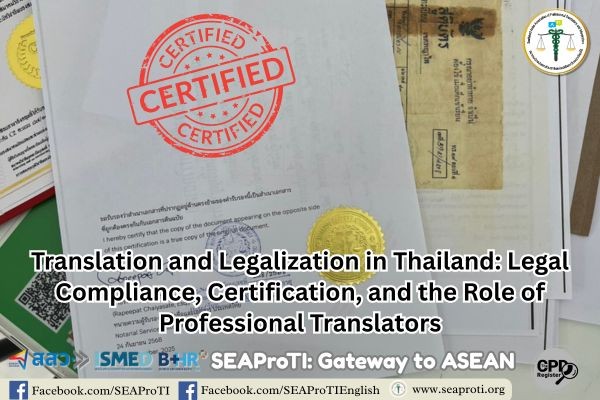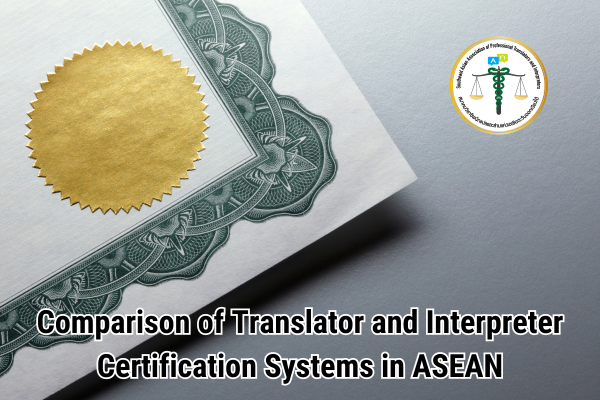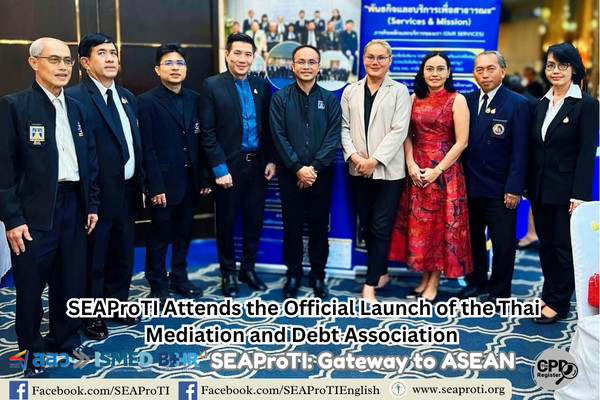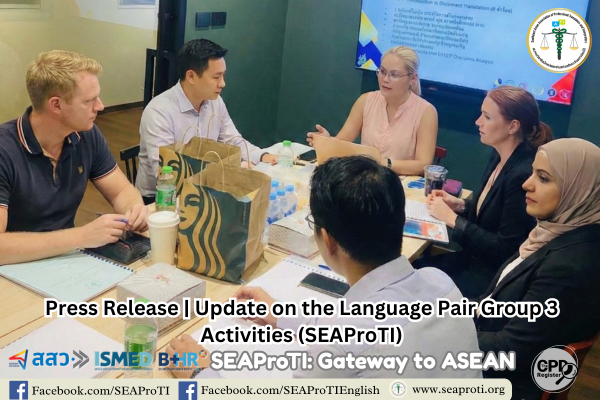Translation and Legalization in Thailand: Legal Compliance, Certification, and the Role of Professional Translators
16 October 2025, Bangkok – Translation and legalization are central to the recognition and enforceability of foreign and domestic documents in Thailand’s legal and administrative systems. This article examines the legal framework governing these processes, the professional standards required for certified translation, and the critical role of the Southeast Asian Association of Professional Translators and Interpreters (SEAProTI) as Thailand’s officially recognized accreditation body. Particular attention is given to the statutory requirements, procedural stages, and judicial implications of translation and legalization, as well as SEAProTI’s growing international recognition in cross-border legal contexts.
Introduction
In Thailand, translation and legalization constitute fundamental steps in ensuring international document compliance. Whether for business transactions, litigation, immigration, education, or property ownership, these procedures guarantee that foreign documents are recognized under Thai law and that Thai documents are accepted abroad.
Since Thailand is not a party to the Hague Apostille Convention, all documents used internationally must undergo full-chain legalization. Under the country’s tightening compliance framework, translation and legalization have evolved from administrative formalities to legal prerequisites. This paper provides an overview of Thailand’s legal and institutional framework, translation standards, and procedural requirements, emphasizing the role of SEAProTI-certified translators and translation certification providers in ensuring authenticity, accuracy, and procedural validity.
Legal and Institutional Framework
Translation and legalization in Thailand operate under a combination of statutory provisions, administrative regulations, and professional accreditation systems that safeguard the authenticity and admissibility of translated materials. The key instruments and institutions include:
- Civil and Commercial Code (CCC) – Governs the evidentiary use of foreign-language materials and the status of public documents in legal proceedings (Civil and Commercial Code, B.E. 2468).
- Ministry of Foreign Affairs (MFA) Regulations – Prescribe the procedures for legalizing official signatures and seals on both Thai and foreign documents (Ministry of Foreign Affairs, 2023).
- Lawyers Council of Thailand Notarial Services Regulation – Authorizes Notarial Services Attorneys to perform notarization, certification of signatures, and other formal attestations (Lawyers Council of Thailand, 2016).
- Foreign Embassies and Consulates’ Regulations – Establish jurisdiction-specific requirements for the acceptance and authentication of documents across borders.
- Southeast Asian Association of Professional Translators and Interpreters (SEAProTI) – Serves as the nationally recognized professional body responsible for certifying translators and translation certification providers, ensuring that translations for legal and administrative use meet standards of accuracy, accountability, and ethics (SEAProTI, 2024).
Because Thailand has not acceded to the Hague Apostille Convention, the legalization chain remains multi-layered: issuing authority → Ministry of Foreign Affairs → foreign embassy or consulate. Where translation is required, SEAProTI-certified translators or certification providers play a pivotal role in guaranteeing linguistic accuracy and procedural compliance before a document can be formally legalized or admitted as evidence.
SEAProTI is the first and only professional association in Thailand officially recognized as maintaining a national pool of Certified Translators and Translation Certification Providers. This recognition derives from Section 9, governing certified translators and certification providers, and Section 10, outlining translation seals and certification procedures, as published in the Royal Gazette by the Secretariat of the Royal Thai Government (Royal Thai Government Gazette, 2024).
Certified Translation and Professional Standards
A. Definition and Legal Relevance
A certified translation is an officially recognized translation accompanied by a signed declaration by the translator affirming its completeness and accuracy. Certified translations are legally required when:
- A foreign-language document is submitted to a Thai government agency, court, or university; or
- A Thai-language document is used abroad for official or legal purposes.
Examples include birth or marriage certificates, court judgments, powers of attorney, police clearances, and academic transcripts.
B. Translators and Certification Providers under SEAProTI
To maintain quality and compliance, translations must be performed by SEAProTI-accredited professionals. SEAProTI maintains a registry of:
- Certified Translators (CTs) – Individuals who have passed peer-reviewed certification and adhere to SEAProTI’s Code of Professional Ethics.
- Translation Certification Providers (TCPs) – Authorized individuals or entities empowered to issue certified translations bearing SEAProTI’s official seal and commission number.
- Translations endorsed by SEAProTI members are recognized by Thai courts, ministries, and foreign embassies for their precision, confidentiality, and accountability (SEAProTI, 2024).
Legalization of Foreign Documents for Use in Thailand
Legalization authenticates the signature and seal of the issuing authority, not the content itself. The process generally involves three stages:
- Certification in the Country of Origin – Documents are notarized or authenticated by competent authorities such as registrars or ministries.
- Legalization by the Thai Embassy or Consulate – The Thai diplomatic mission authenticates the signature or seal of the domestic authority.
- Use in Thailand – Upon arrival, the document must be translated into Thai by a SEAProTI-certified translator before submission to agencies such as the Immigration Bureau, Ministry of Commerce, or Land Department.
Legalization of Thai Documents for Use Abroad
When Thai documents are used internationally—for example, for business registration, immigration, or litigation—the following steps apply:
- Certification by the Ministry of Foreign Affairs (MFA) – Conducted through the Department of Consular Affairs, Legalization Division.
- Legalization by the Foreign Embassy in Thailand – Each embassy applies its own criteria, which may include translation into its national language and certification by a SEAProTI-certified translation provider.
- Processing times generally range from one to five business days, depending on embassy procedures and urgency.
Recent cases demonstrate the growing international trust in SEAProTI certification. A foreign probate court required that translation and document preparation be undertaken by a domestically licensed professional, specifically a SEAProTI-certified translator. This reflects the expanding recognition of SEAProTI’s certification system by judicial bodies abroad, including in Singapore, the United States, and the United Kingdom.
Notarization in Thailand
Thailand does not have common-law notaries public. Instead, Notarial Services Attorneys, certified by the Lawyers Council of Thailand, perform equivalent functions such as:
- Certifying true copies of documents;
- Verifying signatures and identities; and
- Administering oaths and declarations.
For cross-border use, notarized documents often undergo MFA legalization followed by embassy authentication.
Risks and Common Pitfalls
Failure to adhere to certified translation and legalization standards may lead to rejection or legal invalidity. Common pitfalls include:
- Uncertified translators – Work produced by unlicensed individuals is frequently rejected by authorities.
- Inaccurate terminology – Can delay immigration, registration, or litigation processes.
- Forgery or alteration – Submitting falsified documents constitutes a criminal offense under Thai law.
- Improper notarization – Use of unauthorized services may render documents inadmissible in court.
To avoid such issues, parties should rely solely on SEAProTI-certified translators and certification providers, whose credentials can be verified through SEAProTI’s official registry.
Fees and Timelines (Approximate)
- Translation (SEAProTI-certified): THB 800–2,000 per page (depending on language and complexity)
- MFA legalization: THB 200 (standard) / THB 400 (express) per document
- Notarial services: THB 500–2,500 depending on service type
- Embassy legalization: USD 30–150 depending on embassy requirements
Judicial and Evidentiary Acceptance
For a translated or legalized document to be admissible in Thai courts, it must:
- Be translated by a court-accepted or SEAProTI-certified translator;
- Be properly legalized under MFA and embassy protocols; and
- Be authenticated under Section 228 of the Civil Procedure Code.
In cases of dispute over translation accuracy, Thai courts may order re-verification through SEAProTI, the Ministry of Foreign Affairs, or the relevant foreign consulate.
Conclusion
In Thailand’s cross-border administrative and legal landscape, translation and legalization are essential mechanisms for procedural integrity and legal enforceability. The involvement of SEAProTI-certified translators and certification providers serves as a guarantee of compliance, precision, and ethical accountability.
As global legal and business environments become increasingly interconnected, Thailand’s recognition of SEAProTI as the national certifying authority marks a significant step toward harmonizing translation standards with international legal expectations. Engaging qualified and accredited professionals is therefore indispensable for ensuring that both Thai and foreign documents hold full legal effect domestically and abroad.
References
- Civil and Commercial Code, B.E. 2468 (Thailand).
- Ministry of Foreign Affairs. (2023). Regulations on Legalization Procedures. Bangkok: MFA Legalization Division.
- Lawyers Council of Thailand. (2016). Notarial Services Regulation. Bangkok.
- SEAProTI. (2024). Professional Certification Standards for Translators and Interpreters. Bangkok: Southeast Asian Association of Professional Translators and Interpreters.
- Royal Thai Government Gazette. (2024). Publication of Sections 9–10 on Certified Translators and Certification Procedures. Bangkok: Secretariat of the Royal Thai Government.
About Certified Translators, Translation Certifiers, and Certified Interpreters of SEAProTI
The Southeast Asian Association of Professional Translators and Interpreters (SEAProTI) has formally announced the qualifications and requirements for registration of Certified Translators, Translation Certification Providers, and Certified Interpreters in Sections 9 and 10 of the Royal Gazette, published by the Secretariat of the Cabinet, Office of the Prime Minister of Thailand, on 25 July 2024 (Vol. 141, Part 66 Ng, p. 100). Certified Translators, Translation Certification Providers, and Certified Interpreters
The Council of State has proposed the enactment of a Royal Decree, granting registered translators and recognized translation certifiers from professional associations or accredited language institutions the authority to provide legally valid translation certification (Letter to SEAProTI dated April 28, 2025)
SEAProTI is the first professional association in Thailand and Southeast Asia to implement a comprehensive certification system for translators, certifiers, and interpreters.
Head Office: Baan Ratchakru Building, No. 33, Room 402, Soi Phahonyothin 5, Phahonyothin Road, Phaya Thai District, Bangkok 10400, Thailand
Email: hello@seaproti.com | Tel.: (+66) 2-114-3128 (Office hours: Mon–Fri, 09:00–17:00)
การแปลและการรับรองเอกสารในประเทศไทย: กฎหมาย การรับรอง และบทบาทของนักแปลวิชาชีพ
วันที่ 16 ตุลาคม 2568 กรุงเทพฯ — การแปลและการรับรองเอกสารเป็นหัวใจสำคัญของการยอมรับและการบังคับใช้เอกสารทั้งในประเทศและต่างประเทศภายใต้ระบบกฎหมายและการบริหารของไทย บทความนี้นำเสนอกรอบกฎหมายที่ควบคุมกระบวนการดังกล่าว มาตรฐานวิชาชีพที่เกี่ยวข้องกับการแปลรับรอง และบทบาทสำคัญของสมาคมวิชาชีพนักแปลและล่ามแห่งเอเชียตะวันออกเฉียงใต้ (SEAProTI) ในฐานะองค์กรรับรองอย่างเป็นทางการของประเทศไทย โดยให้ความสำคัญกับข้อกำหนดทางกฎหมาย ขั้นตอนการดำเนินงาน และผลทางกฎหมาย รวมถึงการยอมรับในระดับนานาชาติของระบบการรับรองของ SEAProTI
บทนำ
ในประเทศไทย กระบวนการ “แปลและรับรองเอกสาร” ถือเป็นขั้นตอนพื้นฐานในการทำให้เอกสารระหว่างประเทศมีผลทางกฎหมาย ไม่ว่าจะเป็นธุรกรรมทางธุรกิจ การดำเนินคดี การย้ายถิ่นฐาน การศึกษา หรือการถือครองทรัพย์สิน ขั้นตอนเหล่านี้ช่วยรับประกันว่าเอกสารภาษาต่างประเทศจะได้รับการยอมรับภายใต้กฎหมายไทย และเอกสารภาษาไทยจะสามารถนำไปใช้ในต่างประเทศได้อย่างถูกต้อง
เนื่องจากประเทศไทยยังไม่ได้เป็นภาคีอนุสัญญา Hague Apostille Convention เอกสารที่นำไปใช้ในต่างประเทศจึงต้องผ่านกระบวนการ “รับรองแบบครบขั้นตอน” (full-chain legalization) ซึ่งภายใต้มาตรการกำกับดูแลที่เข้มงวดขึ้น การแปลและการรับรองเอกสารจึงกลายเป็น “ข้อกำหนดทางกฎหมาย” มากกว่าขั้นตอนทางธุรการทั่วไป
กรอบกฎหมายและสถาบันที่เกี่ยวข้อง
การแปลและการรับรองเอกสารในประเทศไทยอยู่ภายใต้กรอบของกฎหมายและระเบียบทางราชการหลายฉบับที่มีจุดมุ่งหมายเพื่อรับรองความถูกต้องและความน่าเชื่อถือของเอกสารแปล ได้แก่
- ประมวลกฎหมายแพ่งและพาณิชย์ (พ.ศ. 2468): กำหนดการใช้เอกสารภาษาต่างประเทศในกระบวนการพิจารณาคดีและสถานะของเอกสารราชการ
- ระเบียบกระทรวงการต่างประเทศว่าด้วยการรับรองเอกสาร (พ.ศ. 2566): กำหนดขั้นตอนในการรับรองลายมือชื่อและตราประทับของหน่วยงานทั้งในและต่างประเทศ
- ระเบียบว่าด้วยทนายความผู้ให้บริการนิติกรณ์ (Notarial Services Regulation, พ.ศ. 2559): ให้อำนาจทนายความที่ผ่านการรับรองจากสภาทนายความทำหน้าที่รับรองลายมือชื่อ เอกสาร และคำให้การ
- ข้อกำหนดของสถานทูตและสถานกงสุลต่างประเทศ: ระบุหลักเกณฑ์เฉพาะของแต่ละประเทศสำหรับการรับรองเอกสาร
- สมาคมวิชาชีพนักแปลและล่ามแห่งเอเชียตะวันออกเฉียงใต้ (SEAProTI): เป็นองค์กรวิชาชีพแห่งชาติที่รับรองนักแปลและผู้ให้บริการรับรองการแปล เพื่อให้การแปลมีความถูกต้องตามมาตรฐาน จรรยาบรรณ และความรับผิดทางวิชาชีพ
เนื่องจากไทยยังไม่ได้เข้าร่วมอนุสัญญา Apostille ขั้นตอนการรับรองจึงต้องดำเนินตามลำดับดังนี้
- หน่วยงานออกเอกสาร → กระทรวงการต่างประเทศ → สถานทูตหรือสถานกงสุลของประเทศปลายทาง
ทั้งนี้ หากเอกสารต้องแปล SEAProTI จะมีบทบาทสำคัญในการรับรองความถูกต้องของการแปลก่อนส่งให้รับรองต่อ
SEAProTI เป็นสมาคมวิชาชีพแห่งแรกและแห่งเดียวในประเทศไทยที่ได้รับการรับรองอย่างเป็นทางการให้มีทะเบียน “นักแปลรับรอง” และ “ผู้ให้บริการรับรองการแปล” โดยอ้างอิงตาม ประกาศราชกิจจานุเบกษา พ.ศ. 2567 มาตรา 9 และ 10 ว่าด้วยการรับรองนักแปลและตรารับรองการแปล
การแปลรับรองและมาตรฐานวิชาชีพ
ก. ความหมายและความสำคัญทางกฎหมาย
“การแปลรับรอง” หมายถึง การแปลเอกสารที่มาพร้อมคำรับรองเป็นลายลักษณ์อักษรจากนักแปลว่าสำนวนแปลถูกต้องและครบถ้วนตามต้นฉบับ ซึ่งจำเป็นต้องใช้ในกรณีต่อไปนี้:
- เมื่อเอกสารภาษาต่างประเทศจะนำมายื่นต่อหน่วยงานราชการ ศาล หรือสถาบันการศึกษาในประเทศไทย
- เมื่อเอกสารภาษาไทยจะนำไปใช้ในต่างประเทศ เช่น สูติบัตร ทะเบียนสมรส คำพิพากษา หนังสือมอบอำนาจ ใบรับรองความประพฤติ หรือระเบียนการศึกษา
ข. นักแปลและผู้ให้บริการรับรองภายใต้ SEAProTI
เพื่อให้ได้มาตรฐานและความน่าเชื่อถือ การแปลที่นำไปใช้ทางราชการต้องดำเนินการโดยผู้ที่ผ่านการรับรองจาก SEAProTI ได้แก่:
- นักแปลรับรอง (Certified Translators: CTs): ผู้ผ่านการสอบและประเมินจากคณะกรรมการวิชาชีพ และปฏิบัติตามจรรยาบรรณของ SEAProTI
- ผู้ให้บริการรับรองการแปล (Translation Certification Providers: TCPs): บุคคลหรือนิติบุคคลที่ได้รับอนุญาตให้ออกตรารับรองการแปลพร้อมหมายเลขใบอนุญาตของ SEAProTI
เอกสารที่ผ่านการรับรองโดยนักแปลหรือผู้ให้บริการของ SEAProTI ได้รับการยอมรับจากศาล หน่วยงานราชการ และสถานทูตต่างประเทศ
การรับรองเอกสารต่างประเทศเพื่อนำมาใช้ในประเทศไทย
กระบวนการรับรองเอกสารจากต่างประเทศประกอบด้วย 3 ขั้นตอนหลัก:
- การรับรองในประเทศต้นทาง — โดยหน่วยงานที่ออกเอกสาร เช่น กรมทะเบียน หรือกระทรวงที่เกี่ยวข้อง
- การรับรองโดยสถานเอกอัครราชทูตหรือสถานกงสุลไทย — ตรวจสอบลายมือชื่อของเจ้าหน้าที่ที่ออกเอกสาร
- การแปลเป็นภาษาไทย — ต้องดำเนินการโดยนักแปลที่ได้รับการรับรองจาก SEAProTI ก่อนยื่นต่อหน่วยงานราชการไทย
การรับรองเอกสารภาษาไทยเพื่อนำไปใช้ในต่างประเทศ
เมื่อเอกสารไทยจะนำไปใช้ในต่างประเทศ เช่น การจดทะเบียนบริษัท การย้ายถิ่นฐาน หรือการฟ้องร้อง ต้องดำเนินการดังนี้:
- การรับรองโดยกระทรวงการต่างประเทศ (กรมกงสุล)
- การรับรองโดยสถานทูตของประเทศปลายทางในประเทศไทย ซึ่งอาจต้องมีการแปลเป็นภาษาของประเทศนั้นและรับรองโดยนักแปลของ SEAProTI
- ระยะเวลาการดำเนินการโดยทั่วไปอยู่ระหว่าง 1–5 วันทำการ ขึ้นอยู่กับขั้นตอนของแต่ละสถานทูต
การรับรองเอกสารโดยนิติกรณ์ในประเทศไทย
ประเทศไทยไม่มี “notary public” แบบระบบกฎหมายคอมมอนลอว์ แต่มี ทนายความผู้ให้บริการนิติกรณ์ (Notarial Services Attorney) ที่ได้รับการรับรองจากสภาทนายความ มีอำนาจในการ:
- รับรองสำเนาถูกต้องของเอกสาร
- ตรวจสอบลายมือชื่อและเอกลักษณ์บุคคล
- รับรองคำให้การหรือถ้อยแถลง
ความเสี่ยงและข้อผิดพลาดที่พบบ่อย
- ใช้นักแปลที่ไม่มีใบรับรอง → เอกสารถูกปฏิเสธ
- ใช้ศัพท์กฎหมายผิด → ส่งผลให้การพิจารณาล่าช้า
- ปลอมแปลงหรือแก้ไขเอกสาร → มีความผิดทางอาญา
- การรับรองโดยผู้ไม่มีอำนาจ → เอกสารไม่มีผลทางกฎหมาย
เพื่อหลีกเลี่ยงปัญหา ควรตรวจสอบรายชื่อผู้ได้รับการรับรองจาก SEAProTI ผ่านทะเบียนอย่างเป็นทางการของสมาคม
ค่าใช้จ่ายและระยะเวลาดำเนินการ (โดยประมาณ)
- การแปลรับรอง (SEAProTI-certified): 800–2,000 บาท/หน้า
- การรับรองกระทรวงการต่างประเทศ: 200–400 บาท/ฉบับ
- บริการนิติกรณ์: 500–2,500 บาท
- การรับรองโดยสถานทูต: 30–150 ดอลลาร์สหรัฐ
การยอมรับในกระบวนการยุติธรรม
เอกสารแปลหรือเอกสารรับรองจะได้รับการยอมรับโดยศาลไทยเมื่อ:
- แปลโดยนักแปลที่ได้รับการรับรองจากศาลหรือ SEAProTI
- ผ่านการรับรองจากกระทรวงการต่างประเทศและสถานทูต
- รับรองตามมาตรา 228 แห่งประมวลกฎหมายวิธีพิจารณาความแพ่ง
- ในกรณีมีข้อโต้แย้งเรื่องความถูกต้องของการแปล ศาลอาจสั่งให้ตรวจสอบซ้ำโดย SEAProTI หรือหน่วยงานรัฐที่เกี่ยวข้อง
บทสรุป
ในบริบทของกฎหมายและธุรกรรมระหว่างประเทศ การแปลและการรับรองเอกสารเป็นกระบวนการสำคัญที่ค้ำประกันความถูกต้องและความชอบด้วยกฎหมาย การมีส่วนร่วมของนักแปลและผู้ให้บริการที่ได้รับการรับรองจาก SEAProTI จึงเป็นเครื่องรับประกันคุณภาพ ความแม่นยำ และความโปร่งใสทางวิชาชีพ
การที่ประเทศไทยให้การรับรอง SEAProTI ในฐานะหน่วยงานกำกับดูแลระดับชาติ ถือเป็นก้าวสำคัญในการยกระดับมาตรฐานการแปลให้สอดคล้องกับหลักสากล การว่าจ้างนักแปลมืออาชีพที่ได้รับการรับรองจึงเป็นสิ่งจำเป็นในการให้เอกสารทั้งภาษาไทยและภาษาต่างประเทศมีผลทางกฎหมายอย่างสมบูรณ์ทั้งในและนอกประเทศ
เอกสารอ้างอิง
- ประมวลกฎหมายแพ่งและพาณิชย์ พ.ศ. 2468
- กระทรวงการต่างประเทศ. (2566). ระเบียบว่าด้วยการรับรองเอกสาร. กรุงเทพฯ: กรมกงสุล
- สภาทนายความ. (2559). ระเบียบว่าด้วยทนายความผู้ให้บริการนิติกรณ์. กรุงเทพฯ
- สมาคมวิชาชีพนักแปลและล่ามแห่งเอเชียตะวันออกเฉียงใต้. (2567). มาตรฐานการรับรองนักแปลและล่ามวิชาชีพ. กรุงเทพฯ
- ราชกิจจานุเบกษา. (2567). ประกาศเรื่องมาตรา 9–10 ว่าด้วยนักแปลรับรองและการรับรองการแปล. กรุงเทพฯ: สำนักเลขาธิการคณะรัฐมนตรี
เกี่ยวกับนักแปลรับรอง ผู้รับรองการแปล และล่ามรับรองของสมาคมวิชาชีพนักแปลและล่ามแห่งเอเชียตะวันออกเฉียงใต้
สมาคมวิชาชีพนักแปลและล่ามแห่งเอเชียตะวันออกเฉียงใต้ (SEAProTI) ได้ประกาศหลักเกณฑ์และคุณสมบัติผู้ที่ขึ้นทะเบียนเป็น “นักแปลรับรอง (Certified Translators) และผู้รับรองการแปล (Translation Certification Providers) และล่ามรับรอง (Certified Interpreters)” ของสมาคม หมวดที่ 9 และหมวดที่ 10 ในราชกิจจานุเบกษา ของสำนักเลขาธิการคณะรัฐมนตรี ในสำนักนายกรัฐมนตรี แห่งราชอาณาจักรไทย ลงวันที่ 25 ก.ค. 2567 เล่มที่ 141 ตอนที่ 66 ง หน้า 100 อ่านฉบับเต็มได้ที่: นักแปลรับรอง ผู้รับรองการแปล และล่ามรับรอง
สำนักคณะกรรมการกฤษฎีกาเสนอให้ตราเป็นพระราชกฤษฎีกา โดยกำหนดให้นักแปลที่ขึ้นทะเบียน รวมถึงผู้รับรองการแปลจากสมาคมวิชาชีพหรือสถาบันสอนภาษาที่มีการอบรมและขึ้นทะเบียน สามารถรับรองคำแปลได้ (จดหมายถึงสมาคม SEAProTI ลงวันที่ 28 เม.ย. 2568)
สมาคมวิชาชีพนักแปลและล่ามแห่งเอเชียตะวันออกเฉียงใต้ เป็นสมาคมวิชาชีพแห่งแรกในประเทศไทยและภูมิภาคเอเชียตะวันออกเฉียงใต้ที่มีระบบรับรองนักแปลรับรอง ผู้รับรองการแปล และล่ามรับรอง
สำนักงานใหญ่: อาคารบ้านราชครู เลขที่ 33 ห้อง 402 ซอยพหลโยธิน 5 ถนนพหลโยธิน แขวงพญาไท เขตพญาไท กรุงเทพมหานคร 10400 ประเทศไทย
อีเมล: hello@seaproti.com โทรศัพท์: (+66) 2-114-3128 (เวลาทำการ: วันจันทร์–วันศุกร์ เวลา 09.00–17.00 น.)

























